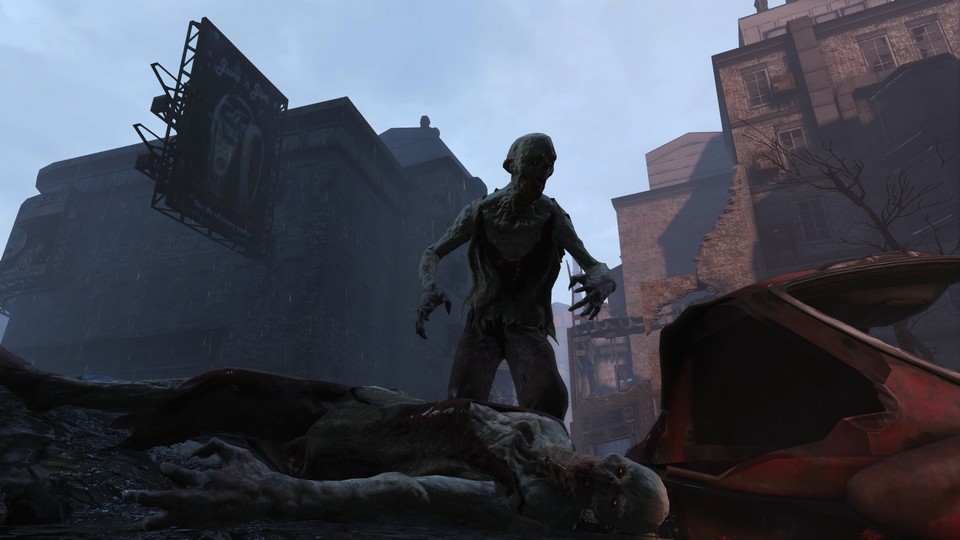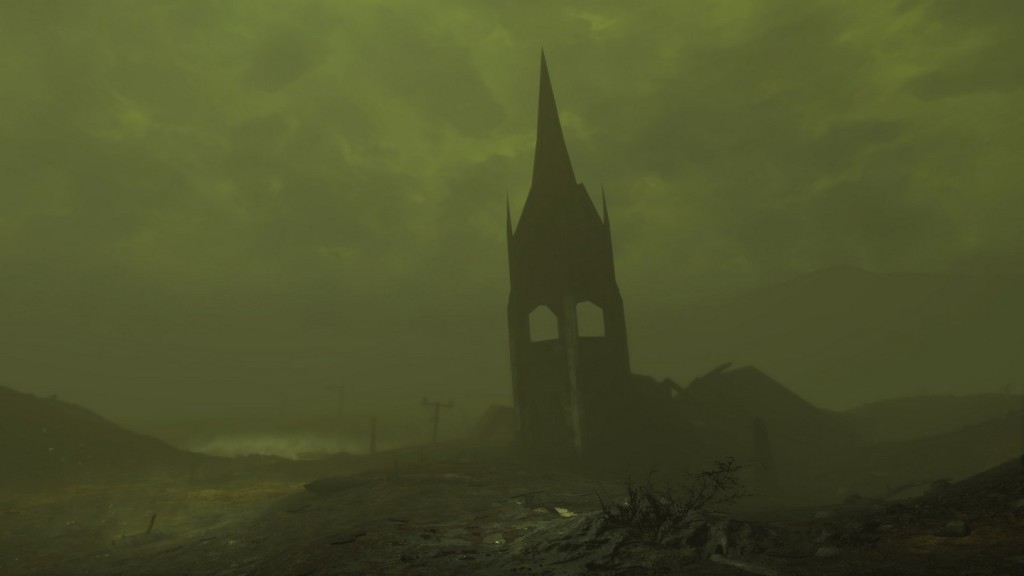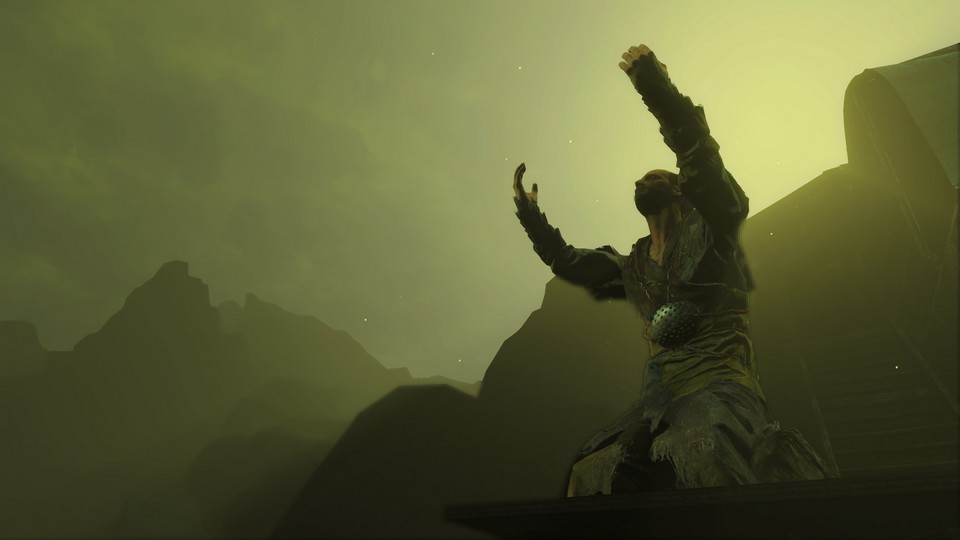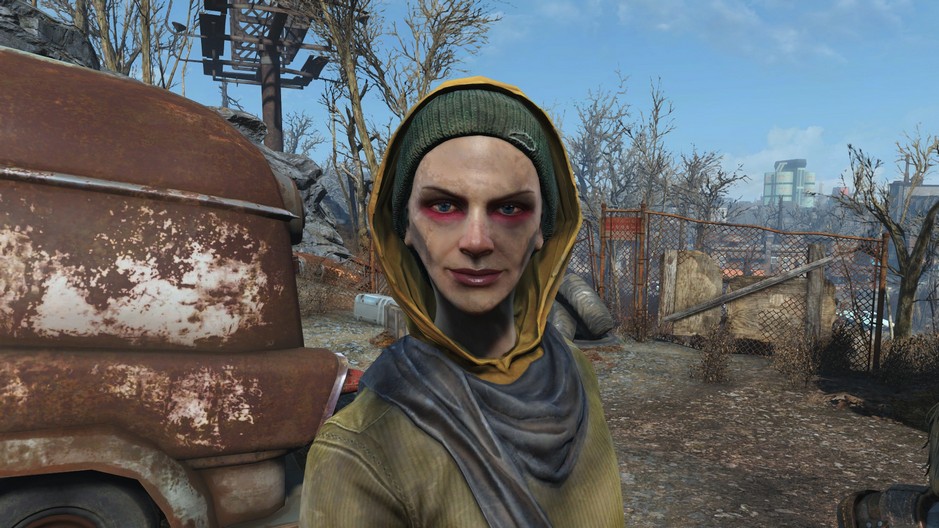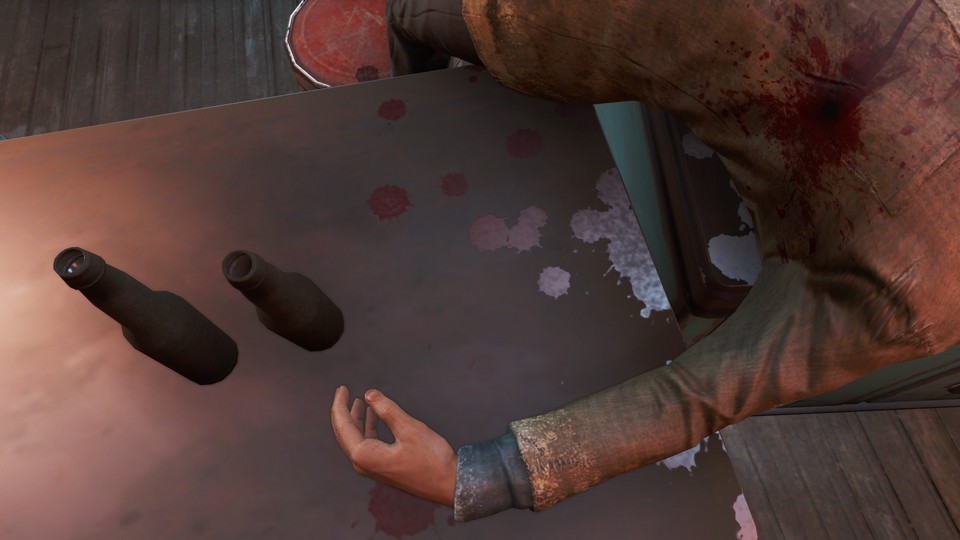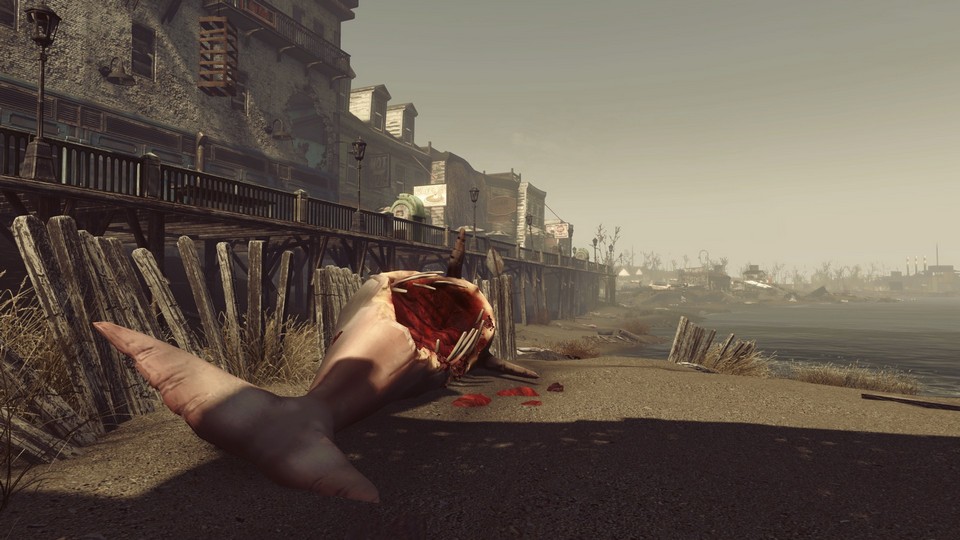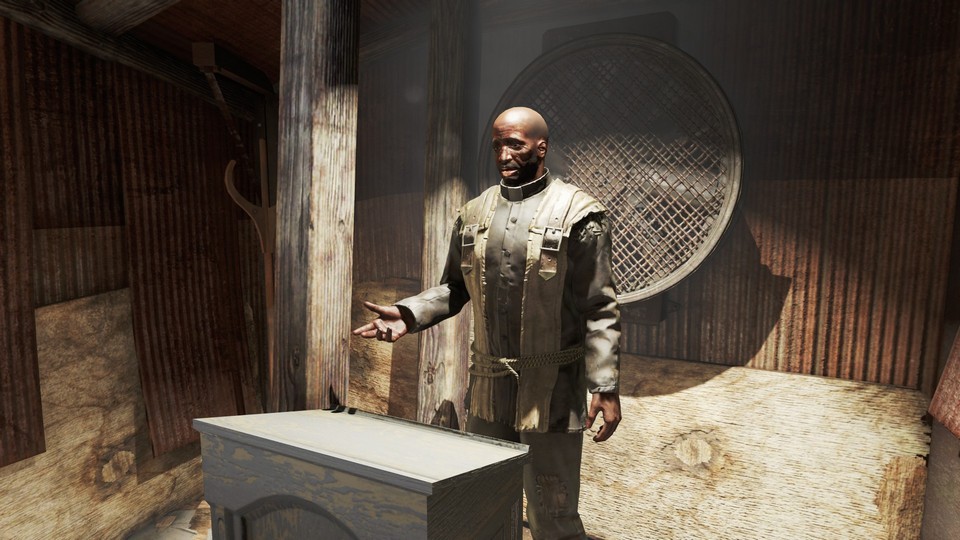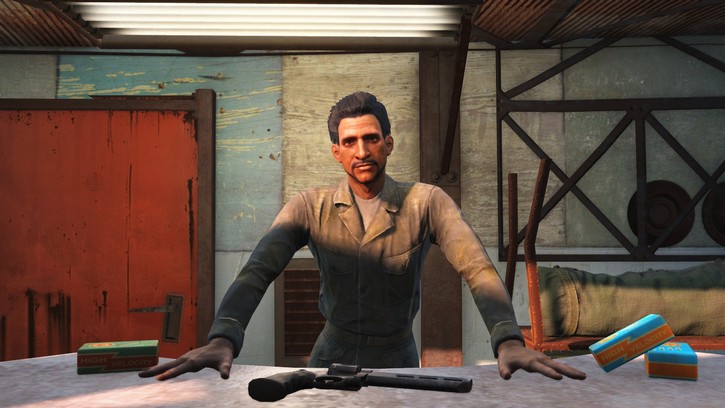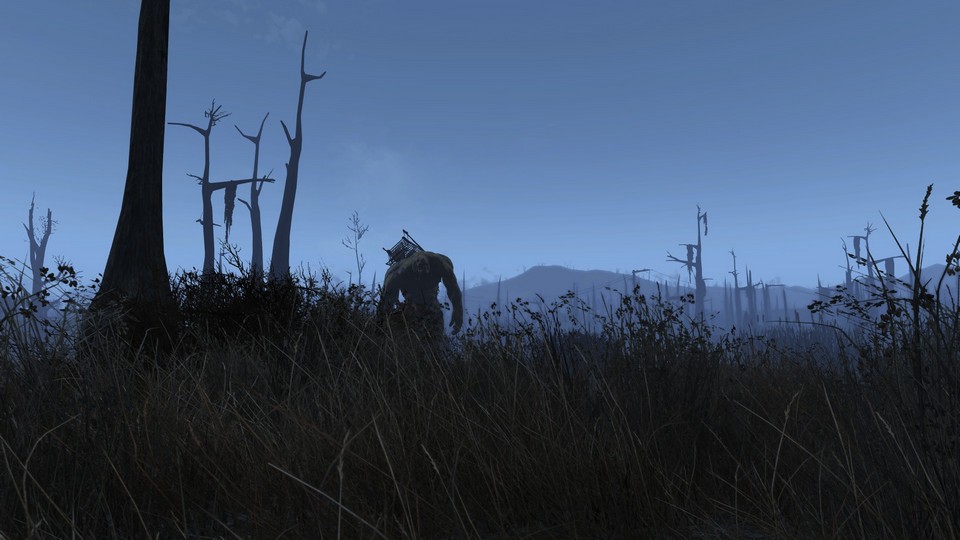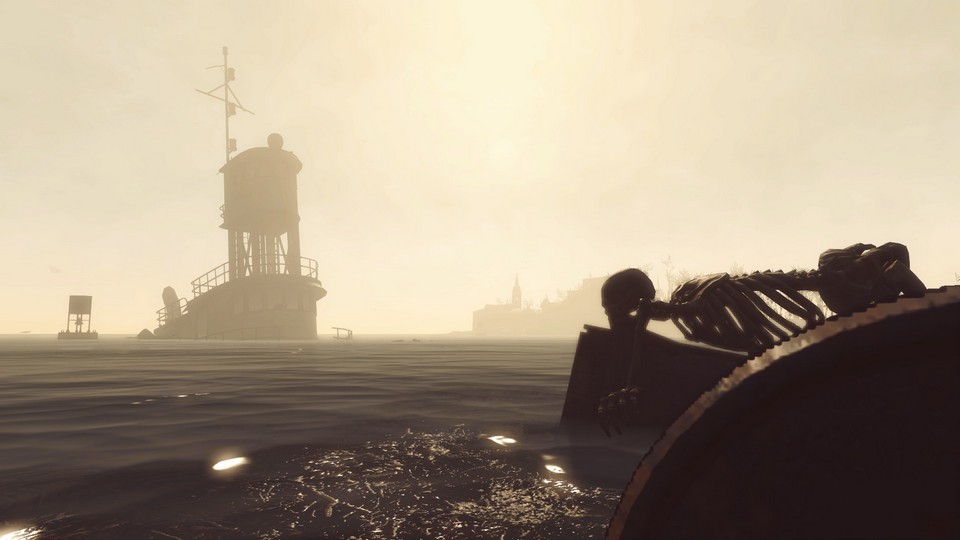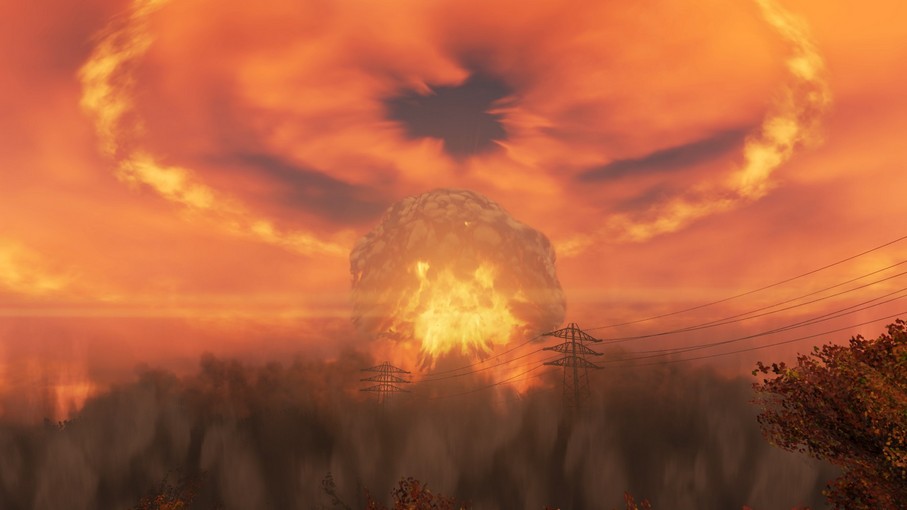I will show you fear in a handful of dust
So says TS Eliot in his murky epic ‘The Waste Land’. Like a landscape after some forgotten catastrophe, the poem is grim and expansive, full of obscure references to a happier time before. But, strangely, it’s also full of references to a happier time yet to come.
In this the poem is not quite so bleak as all that. It’s not simply about decay and finality, a modernity in irretrievable crisis, but about change and, eventually, rejuvenation.1See this (by way of some obscure references) in the poem’s nods to the east: the penultimate line taken from the Upanishads – ‘Datta. Dayadhvam. Damyata.’ – meaning ‘Giving. Compassion. Self-control.’; in the chapter named after Bhudda’s Fire Sermon, the call for liberation from suffering through transcending material interests. In his notes Eliot likened the Fire Sermon to the Sermon on the Mount, both being key teachings on the attainment of perfection through the practice of living, about living the correct way because, for distant and ungraspable reasons, you’ll be glad you did. The Sermon on the Mount is in the Gospel of Matthew, in which Jesus later foretells of the apocalypse. To us the wasteland is of course inseparable from the apocalypse that creates it. But the apocalypse, like Eliot’s poem, is not about conclusion, The End; in the Christian theology it’s about a process.
This makes for a strange kind of ambivalence in our cultural attitude towards it, whether Christian or not. For many this is felt too while gazing across the harshness and quiet possibility of any desolate view.
We’re talking here about hinterlands, in-between places; change, with all its horrors and promise. We see this in books and films all the time; we live this, in that uniquely engaging, exercising way, in computer games.
The waste of time
In 1988, during the final throws of the Cold War, a game was published called Wasteland, a roleplayer involving moral dilemmas in a ruined America following nuclear desolation. In 1997, several of its developers created a successor to the post-nuclear crown, which (following failure to acquire the naming rights for Wasteland) they called Fallout.
The Fallout series has continued from the ’90s to the present with games set across decimated US cities and the wilderness in between, which is referred to simply as the Wasteland. Narratively each game follows the dweller of a pre-war fallout bunker (or ‘vault’) colony on their first trip to the surface. They are ‘open-world’ exploratory games where the player rambles among the wastes and ruins, picking up and losing again the thread of the central plot as others crowd in, notably through the epistolary-style computer terminal text notes which reveal the stories of certain ruins or abandoned vaults, forcing imaginative work on the player despite the medium’s power to render anything visually. The effect is eerie and literary, and the grimness is boobytrapped with dark humour.
The Wasteland’s aesthetic is a future seen through the prism of ’50s-style Americana which a 2077 nuclear war with opposing superpower China (probably a joke when first written in the ’90s; less so now) has left frozen in time until humans eventually re-emerge to pick through the echoes of their former world. It’s made from a rich cultural soup of apocalyptism, vigilantism, survivalism, Red Terror, and the bobbing croutons of religious End Time. Beneath this simmers a political stock of individualism, pragmatism, asceticism, and obsession with the latent chaos of things.
2015’s Fallout 4 is set in Massachusetts and taps easily into the foundational American mythology of the area.2Beyond the game’s more brash appropriations, such as of the first violence of the War of Independence at the Battle of Concord (in the game still taking place in Concord, but with British soldiers replaced by drug-crazed Wastelanders and a bipedal mutant lizard), there is the Railroad. This secretive organisation guides newly self-aware ‘synths’, or synthetic humans, away from their shadowy maker – the Institute, a distant corruption of the Massachusetts Institute of Technology. The Railroad is based on the Underground Railroad, a network of agents and safehouses used by escaped slaves to flee from the south to the free states and Canada. Using the setting’s history (slaves and the process of people around them coming to realise their humanity) and transposing it onto a hypothesised technological question (‘built’ humans and a similar realisation among those around, as well as within themselves) is a solid sci-fi tactic – even if the technological aspect was lifted straight from Blade Runner. It may also seem slightly crass, given the seriousness of slavery, but the parallel is of course not between slaves and synths but between those who look upon them. A transposition like this is necessary if the player is to grasp, if only for a moment, that process of realisation among those who had been raised to think of slaves and African people as sub-human, and who came to see in a different way. That realisation is something which, now, is handed to us, taken as assumed, but in the Wasteland we are presented with a challenge: the idea of a person who is identical in flesh but made through an industrial process. Through this new idea we are forced to consider the nature of humanity. The realisation – of the essential equality of people – is therefore earned anew rather than inherited, and it’s all the richer for it. This is the empathetic value of narrative delivered through the hypothetical power of science fiction. Footnote over. It made $750 million dollars in its first 24 hours of sale. It’s idealogical seams run deep, its historical links stretch far, and, yes, many play it just to run around and shoot things. But to ask the question – what is it we enjoy when we enjoy Fallout? – is to enter the Wasteland and ask, in a certain sidelong way: what is America?
For such a subject the scale of this piece is meagre, so the cultural connections made will be perhaps unusual and certainly sweeping. But we’re faced with our largely unexamined desire for the bleakness of this world, with the ensuing questions of where this desire is from and how the game meets it. So the task of finding some useful, craftable explanations lies ahead. Stumbling bleary-eyed from the vault, we’ll see how far we wander.
City upon a hill
Europe’s relationship with the Americas has had an apocalyptic streak from the outset. And, matching the apocalypse motif itself, the streak was a destruction budded with creation and new beginnings. This was after all a land untouched by Old World hands; in its seeming innocence and beauty Christopher Columbus was convinced he would find the Garden of Eden. A return of Eden is associated by many with New Jerusalem, the coming of which is an integral part of the apocalypse.
In 1620 a group of separatist Puritans left Plymouth, Devon, to eventually found a new Plymouth in New England. They were fleeing a political climate which was itself apocalyptic, with the attempted destruction of the Houses of Parliament 15 years previously and James I’s ensuing oppression of Catholics and Protestant Puritans. Where they had before seen life as a spiritual journey to the Promised Land, they now left the demonic forces of England to make the journey a physical one, and so make the destination equally so. The prophecies of the Israelites were brought to life in their migration, the trials of its journey, and the Edenic shores at its end.
Their eventual name, the Pilgrim Fathers, was explicitly Biblical, and their Protestant apocalyptism grew from the notion of building from nothing the paradise foretold as the millennial kingdom – the ‘thousand years’ of prosperity before the Second Coming.
In what came to be the United States of America, this sense of the apocalypse, of actively living out its story, did not diminish but evolved with the needs of the time. In the nineteenth century John Nelson Darby founded a religious movement in Plymouth (Devon again) based on the belief in Christ returning to earth not after but during the millennium. At a time when the industrial revolution had made things seem distinctly un-heavenly in appearance this idea gained traction, especially in the States, where the language of apocalypse then moved from ‘postmillennialism’ to ‘premillennialism’. The importance of this shift can’t be overstated. With premillennialism the motivation to build a better world, heaven on earth, all but evaporated when it was thought that judgement could happen at any moment. The End Time became more current than ever.
Infatuation with the apocalypse extended into the twentieth century to refract through its mass-cultural lenses. Hal Lindsey’s Late Great Planet Earth, published in 1970, was a major popularisation of the prophecies of the end of the world, transposing them to a Cold War setting and arguing that the rebirth of the state of Israel, as foretold, was the key sign which all previous transpositions lacked, proving that this time the end was thoroughly at hand. The book resulted in many millions of sales and even a 1978 film version narrated by Orson Welles, having caught the filmic genius in his Will do Literally Anything years.
Much of what the Bible has to say on the end of the world occurs in the the books of Daniel and Zechariah, as well as the positively psychedelic Revelation of St John the Divine. Lindsey pulled out lurid scenes to make things not just current but imminent: ‘Their flesh shall consume away while they stand upon their feet,’ says Zechariah, ‘and their eyes shall consume away in their holes, and their tongue shall consume away in their mouth’. Lindsey claims that this quote makes sense only in terms of a nuclear explosion.3Lindsey also notes what is a strange link to Fallout lore. St John says: ‘And the sixth angel poured out his vial upon the great river Euphrates; and the water thereof was dried up, that the way of the kings of the east might be prepared.’ This nefarious army, numbering ‘200 thousand thousand men’ was interpreted by Lindsey (and has commonly been since), as China, the army of which was apparently 200 million men in the ’70s. Such uses of scripture dovetailed neatly with the growing sense that (as Welles booms from a suddenly well catered stretch of California desert) ‘our technology has advanced beyond our moral judgement!’
More recently the apocalypse popularisation mantle has been taken up by the Left Behind series and its film versions led by the inimitably shouty Nicolas Cage (who, God willing, will someday be cast as St John going insightfully nuts on his Greek island). And even to Britain the mythos spreads – or, in a way, returns. A jittery but very sincere man once sold me a book called Survivors in a square in Brighton, taking my 84p and saying, sheepishly, ‘It’s actually, you know, actually quite truthful’. Survivors, which I came to learn is distributed in such situations all over the world, has similar imagery of Russian nuclear strikes and an evil United Nations headed up by the antichrist. But Survivors ‘corrects’ Left Behind in moving the rapture to come after the tribulations rather than before. This is the classic postmillennial/premillennial bone of eschatological contention and we’ll continue to see such interpretations and counter-interpretations spar like UN warplanes dogfighting with angels over the skies of Jerusalem – a scene presented, straight-faced, at the climax of Survivors.
Regarding that shifty UN, Survivors and Left Behind relate the Bible’s ‘confederation of ten nations’, the entity which forms and makes up the antichrist’s empire, to the UN, while Lindsey had before plumbed for the European Economic Community. This is a good example of how prophecy moulds itself to the happenings of the time, as more recently the confederation is seen in the Middle East in the form of ISIS4Which by all serious accounts dresses its political ideologies with a fantastical and evocative mission of realising the conditions of the (really quite similar) Islamic apocalypse. An interesting though suicidally unpopular link to draw would be between apocalyptism – in the sense of living to bring about a pre-ordained story – in both US and ISIS contexts. It’s a mindset as inherently paradoxical as it is, perhaps, far-reaching. But such comparisons (say, Puritan Christianity as against Wahhabi Islam) are made fraught by the shifting and all but invisible line between religion and politics throughout history. (so-called, etc), in regional coalitions established to fight ISIS, and basically anything that can be construed as being made of ten other things.
Apocalypse inc.
The continued transposition of the apocalypse into geopolitical contexts has seen the religious aspect diminish while the story itself endures. An increasingly prominent US sub-culture is that of ‘Preppers’, who are fascinated more by the logistical aspects of apocalypse-style happenings. They spend time readying for a world of hellish survival brought about by events ranging from the traditionalist’s fire and brimstone to a de rigueur electromagnetic pulse attack. Many opt for the comfortably vague ‘economic collapse’.
While not universal to Preppers’ language, a common image is of a world which, post-calamity, is full of adversaries. Not necessarily in the sense that it is everyone out for themselves, but rather of nonspecified badguys who will at that moment reveal themselves, assorted looters and rapists springing from behind every fire hydrant and picket fence. Though it’s important to note that Preppers’ motivations and depths of interest are as diverse as those who engage in prepping, and their political spread is far broader than the more obvious right-wing foundations one sees in its focus on individual self-reliance, the belief in the hostility of the outside world and the innateness of behaviour. These people and their rangy motivations are of course unified most significantly in what they consume: prepping is now a multi-billion dollar industry.
Fallout, equally, is a world of mostly well defined (and well armed) goodies and baddies.5While the series excels at moral ambiguity in the context of set-piece events and interactions, it must be said that its wider population exists in a fairly neat duality of earnest homesteaders and homicidal gangs. This is particularly the case when at the hands of its current developer, Bethesda Softworks, the writers from which, while excellent world-builders, perhaps don’t make the same use of ambiguity of decision-making (and surreal humour) employed so well by Obsidian, maker of previous titles. It’s this sense of discomforting moral grey areas which ought to characterise survivalism and the Wasteland. While not really reflecting reality, this goodie/baddie division does all the better project the demons of American consciousness – faceless home invaders, marked legions of the antichrist and various other boons to what is a spirited arms industry. Preppers are the apotheosis of these swirling cultural forces, but, while occupying a somewhat extreme position on the how-often-do-you-think-about-the-breakdown-of-society scale, theirs is not fringe behaviour. There are upwards of three million Preppers in the US. The apocalyptic theology is not always a major part of their discourse, which is more along the lines of ‘Let’s talk about accumulating and hoarding toilet paper‘ and ‘Tomahawks?‘, but it nonetheless lies beneath, and such discourse shows how it adapts to modern contexts.
Preppers also remind us that the notion of a looming calamitous event signifies the beginning of a new mode of living and, at its cultural root, the belief in a process that will eventually lead to paradise. The apocalypse is in this sense a utopian ideal, so the period of chaos and violence becomes a necessary chapter to move through. It is therefore subject to a certain – really quite complicated – notion of desire.
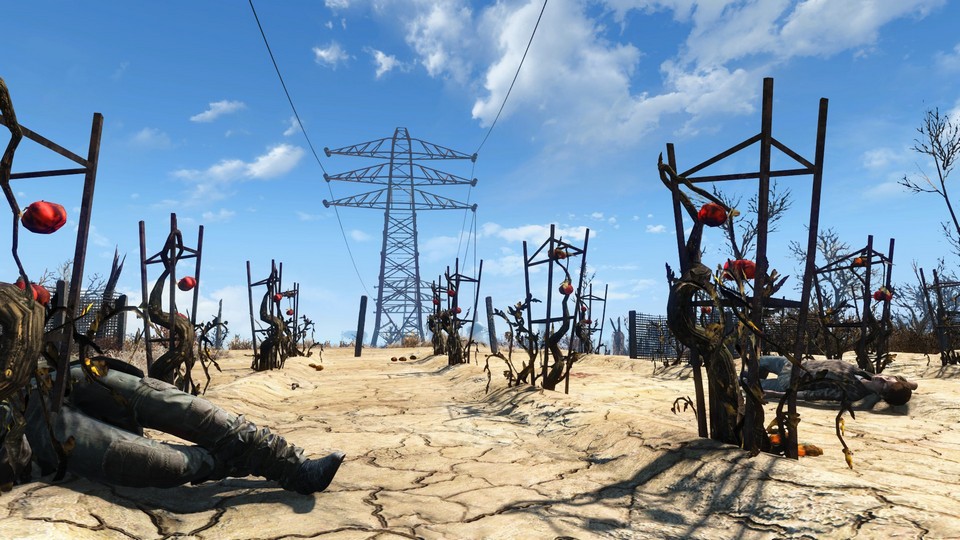
The End Timer is both anxious and excited about the apocalypse – excited because, although a time of horror, it will mean the ascension of the righteous. The Prepper is anxious and excited but with a secular tinge, where the yearned-for simplicities of protecting one’s family become the prime, life-affirming directive (plus gunfights with badguys!). The watcher of Mad Max or player of The Last of Us is anxious of the bleakness of the world they are entering and the evil of its inhabitants, but they are excited by that very evil, by having life’s ambiguities scrubbed away to reveal who is simply the raider or zombie and who is the friend. In the perverse comfort of this stripped-down world, they are keen to triumph.
Home on the range
So the Wasteland can be considered a manifestation of the Bible’s seven-year Tribulation and its depravities, but it is not without its day-to-day life and economy. These are also extensions of desires latent in the cultural context from which Fallout springs, and these desires are interrelated.
In Common Sense, the fiery and widely read 1775 pamphlet arguing for American independence from Britain, Thomas Paine stated that ‘Monarchy in every instance is the Popery of government’. Here we see a Puritan distaste for Catholicism and its centralised religious authority being aligned, at the time of the US’s ideological birth, with a distaste for centralised government. This association is a kernel of the American small-state sensibility. A probably reductive but nice-sounding way of describing it is this: where French republicanism saw government, the sum of the peoples’ will, as a solution to monarchy, the American consciousness pitched it as synonymous with monarchy, so inherently tyrannical. In this context the distrust for the very idea of government, no matter its given composition, is able to run deep, and room opens for a strong and widely felt will to individualism.
From the visitor’s point of view, trundling along some laser-straight desert highway, it’s easy to ponder at how the massive low-density spaces of the US might engender a sort of homestead mentality, where the notion of paying tax to support a large federal government based several states over, for it to then channel that money into the welfare of poor urban populations yet further away, would feel no less absurd than sending taxes across the Atlantic to the king of England. Individualism – and in turn conservatism – are a function of the land, its vastness, its beauty and hostility. There’s little surprise to learn that what has become the extremity of these trends of thought, libertarianism, was to find its contemporary meaning in the US.
High on liberty, low-to-nil on authority, Fallout is a libertarian fantasy. It is also a Darwinian fantasy, meaning it scores high on ultra-violence. It’s a world of warring settlements, lunatic frontiersmen in decrepit shacks, and sudden, bloody escalations. There is no government to speak of in the Wasteland, no centralised power of any kind beyond vigilantes and militia.6Like the benevolent Minutemen of Fallout 4 who nod directly to those groups so romanticised in the American psyche, symbols of vigilance and self-reliance. The Wasteland’s inhabitants live a forced asceticism, each picking their own path in what makes for a haggard reflection of the Protestant drive to study the practicalities of living and the quest for the good life – the same quest which brought the Pilgrim Fathers to the shores of Massachusetts.
Each Wastelander is a philosopher, therefore, a pragmatist, and of necessity a trader. The last of this trinity is the basis of the Wasteland’s economy, which has a currency (pre-war bottle caps – a joke on the cultural capital of Coca Cola) and an entrepreneurialism which embraces a broad moral spectrum.
Benjamins
German sociologist Max Weber argued in his infamous essay ‘The Protestant Ethic and the Spirit of Capitalism’ that a crucial shift in the character of capitalism occurred in nineteenth century America, where business practice changed, Weber says, from treating money as a means to the end of buying further things to viewing it as an end in itself. He highlights Benjamin Franklin, with his folksy economic nuggets (coiner of ‘Time is money’ and ‘A penny saved is a penny earned’), as an exemplifier of the capitalist spirit whose end-in-itself stacking of greenbacks was a new iteration of an older process, namely the Protestant ‘calling’ to manifest God’s work in the act of labour switching in the American context to see God’s work as the results of labour. This creates a direct link between salvation and one’s pile of money. Franklin’s worldview was strongly influenced by the Calvinism of his father, who would often repeat the line from Proverbs, ‘Seest thou a man diligent in his business? He shall stand before kings’.
The degree to which this economic-religious overlap can be exemplified in Franklin is contentious, but the future Founding Father was doubtless influential and Weber’s broader theory is a powerful one. Certainly a keen and meticulous business practice, based on a notion of rigorous virtue, was a contribution of German immigrants to America. Weber claims that there later came to be abhorrence from Germany at the perceived American reduction of virtue to such utilitarian and pragmatic (that is, capitalist) ends, but the initial sense of monetary rigour did travel in the mentalities of immigrants from Germany along with the Puritan ideology of Calvanism. From England came Methodism, and all of these influences writhed in the intellectual lobster trap of New England. One of Weber’s more slyly made arguments runs like this:
There were complaints of a peculiarly Calculating sort of profit seeking in New England, as distinguished from other parts of America, as early as 1632. It is further undoubted that capitalism remained far less developed in some of the neighbouring colonies, the later Southern States of the United States of America, in spite of the fact that these latter were founded by large capitalists for business motives, while the New England colonies were founded by preachers and seminary graduates…
The asceticism of the seminaries was found to be an apt mindset for business, he argues. It may seem counter-intuitive to link the abstinence from worldly pleasures with capitalism, but John Wesley, a founder of Methodism, had seen the same link when he said ‘the Methodists in every place grow diligent and frugal; consequently they increase in goods. Hence they proportionately increase in pride, in anger, in the desire of the flesh, the desire of the eyes, and the pride of life.’
Here is a picture of small business owners, merchants, living simply and permitted no drive but the clawing together of coins, coming to have no definition of themselves but the stack of metal, taller or shorter than the next individual’s, and so jealousy and boastfulness give way to cash-in-hand pleasures and the baser wants, and those claws find applications beyond coinage. Just another day in the Wasteland.
Bleaksploitation
In an outsider’s squinting at American culture, glimpses of apocalyptism and individualist attitudes to faith and economy are there, and Fallout can represent a dark accentuation of them. But the experience of the game’s world, the decision to return to it, is something more complex than merely an endorsement or even ironic rejection of these themes. What ties them, I think, beyond a distant and history-warped Protestantism, is loneliness.
What’s different about games from books or films, and especially open-world games like Fallout, is that a player truly inhabits them. Time passes, second by second, and, aside from fulfilling whatever quest that’s dolled out by the game’s writers, one can simply sit and gaze, or wander a Wasteland made of brutality and occasional warmth, but mostly of silence. Loneliness in this context, combined with a player’s control over the flow of time and how it is spent, is actively sought.
Fallout exercises the fantasy of the situation in which it is morally acceptable to kill – this fantasy is clear to any honest appraisal of action and violence in the arts (and of any glance over the promotional material of the National Rifle Association). But this game equally exercises a not-unconnected fantasy of the situation in which it is acceptable, even necessary, to be profoundly alone.
One might also call this solitude, with that word’s more positive connotations towards being alone, but this perhaps doesn’t capture the befuddled modernity of what could, for the player of Fallout, be called aspirational loneliness. Still, solitude in the American consciousness and beyond is not without its pin-ups, and leaving behind what Fallout is to go further into what it permits us to exercise, deep in our troubled heads, we might turn to the most famous shack-dweller of them all, Henry David Thoreau.
Romantic individualism I: Living in a shed
Thoreau was a writer in the broadest yet purest sense; he was a muser. But this was a musing fundamentally about the pursuit and meaning of work. He lived for two years in the woods beside Walden Pond in Massachusetts, writing an account of the time, Walden. There he built a shack, mused, hunted, shot the breeze with assorted rustics, mused some more, and, if Walden is anything to go by, spent inordinate amounts of time staring at individual leaves and bits of wood. Such pursuits were all for Thoreau about work in the sense of both practical and spiritual fulfilment, these being more or less inseparable for him. The keys to living correctly were to live closer to nature and in contemplative solitude. He says:
They mistake who assert that the Yankee has few amusements, because he has not so many public holidays, and men and boys do not play so many games as they do in England, for here the more primitive but solitary amusements of hunting, fishing, and the like have not yet given place to the former. Almost every New England boy among my contemporaries shouldered a fowling-piece between the ages of ten and fourteen; and his hunting and fishing grounds were not limited, like the preserves of an English nobleman, but were more boundless even than those of a savage.
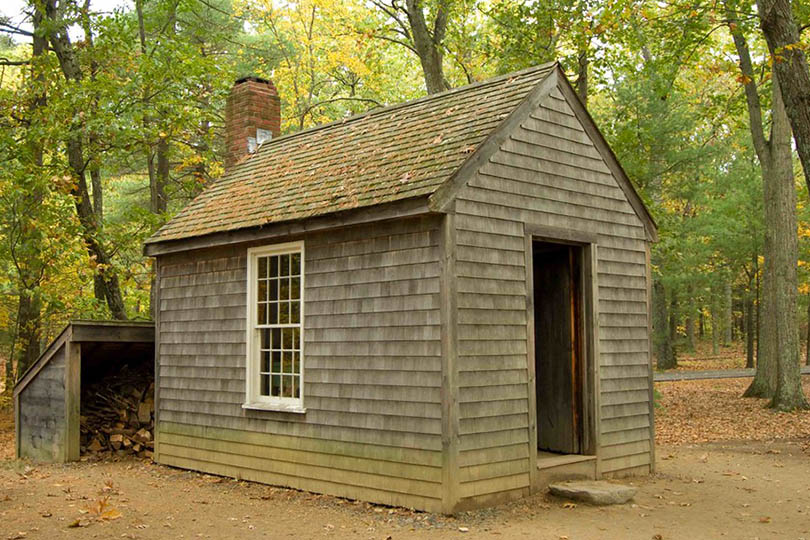
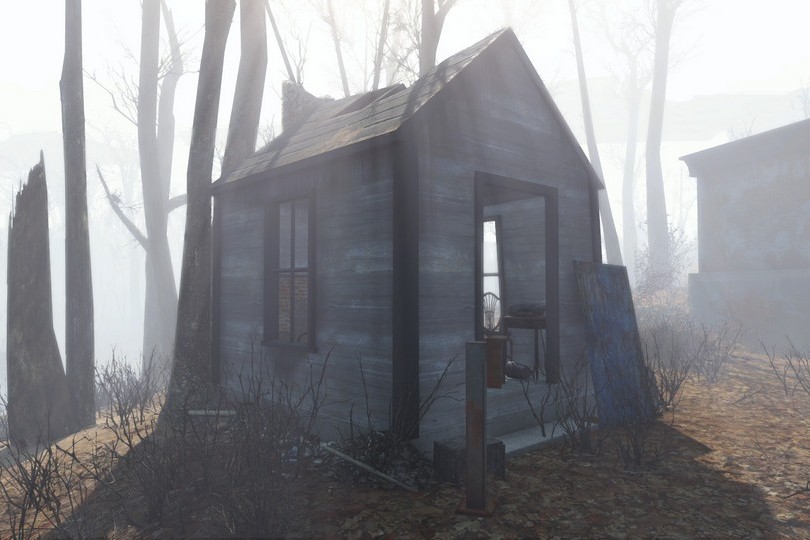
This set of ideas has led to Thoreau being taken up by those of contrasting views. He famously wrote the essay ‘Civil Disobedience’ after going to prison for refusing to pay tax – a resort held in special regard by those who might see government as naturally demanding and invasive, such as the political right – but had refused to pay it on the grounds that it was funding a state still involved in slavery – a principle respected by those opposed to notions of inherently superior or inferior groups or of an economic slave class, like the left. His linking of work with spirituality offers a redefinition of work which can be embraced by the hippy and a redefinition of spirituality which can be embraced by the stock broker. He is used as a foundational figure of anarchists and libertarians alike. The common denominator, though, is anti-authoritarianism, and while his appeal ranges around it still follows the Protestant will to think about how to live and to do so on one’s own terms.
Unmentioned in Walden is that Thoreau’s shack was on the property of Ralph Waldo Emerson: writer, philosopher, thinker of pleasant thoughts. Sprouting from Emerson’s essay Nature is the bits-and-bobs philosophy of transcendentalism, of which Emerson and Thoreau became figureheads. Their dreamy yet workmanlike sense of things was shot through with the love of labour and simple living, reverent of nature yet firm in the belief that it is ultimately property to be used. Emerson says:
Nature is thoroughly mediate. It is made to serve. It receives the dominion of man as meekly as the ass on which the Saviour rode. It offers all its kingdoms to man as the raw material which he may mould into what is useful… One after another, his victorious thought comes up with and reduces all things, until the world becomes, at last, only a realized will, the double of the man.
Here are echoes of the earth being ‘given to the children of men’ in Psalms, and the peculiarly American accentuation of this in the doctrine of ‘manifest destiny’, the American people’s God-given (or Puritan-given) mission to dominate the land from New England to California. Here too is a certain muscular notion of the will, one of transcendentalism’s various scavenged influences alongside Protestantism, eastern philosophy and romanticism. All of these are concerned with asceticism and solitude, of course, and all of them came from (or via) Germany.
Romantic individualism II: Hating everyone
One of the German language’s many words without a direct English counterpart is ‘waldeinsamkeit’, which denotes the feeling of being alone in a forest. That’s ‘wald’ as in English (and the ‘wald’ of Walden Pond), and ‘einsamkeit’, which can translate to both ‘solitude’ and ‘loneliness’. ‘Einsamkeit’ feels more ambivalent than its English equivalents perhaps because it relates to a German tradition of solitude which is neither happy nor sad but improving. This is intellectual penetration through isolation, being ’emancipated from the prevailing vulgarity’, as a dependably dour Arthur Schopenhauer puts it.
Schopenhauer’s work made it to New England in the 1870s and Emerson, despite being himself as chipper as the German was glum, became influenced by it – not the atheism, but certainly Schopenhauer’s interest in the philosophy of the Upanishads and, perhaps related to this, the seriousness and directness with which he confronted the issues of life, without the abstract word-bingo of contemporaries like Hegel. In ‘Counsels and Maxims’, Schopenauer says:
Let me advise you, then, to form the habit of taking some of your solitude with you into society, to learn to be to some extent alone even though you are in company…If you do that, you will not live so much with other people, though you may appear to move amongst them: your relation to them will be of a purely objective character. This precaution will keep you from too close contact with society, and therefore secure you against being contaminated or even outraged by it.
There’s something almost warming in Schopenauer’s essential distaste for other people, like a survivalist’s campfire, and his unabashed hankering for solitude was to inspire many.
As cuddly Emerson makes a strange but fitting counterpart to grouchy Schopenhauer, so too did their respective acolytes in cheery woodsman Thoreau and bedridden überbastard Friedrich Nietzsche.
Walden can be compared to Nietzsche’s mad and incredible Thus Spoke Zarathustra in that both are brazen anti-establishment books of literary philosophy: far from the icy rigours of analysis and instead using anecdote and narrative to create poetic accounts of how we ought to live.
Like Thoreau, Nietzsche loved Emerson, keeping a copy of Nature in his pocket always, and like Thoreau his entire philosophy is built on solitude both as an idea (a means of stripping away the malevolent influence of society) and as a practice (a thing to actually go and do). Nietzsche said that his ‘radical retreat into solitude as a self-defence against a contempt for men’ made him, ever humble, ‘pathologically clairvoyant’.
Away from people, mentally or physically, he felt away from their morality, and from this a philosophy sprang which, along with those of the two New Englanders, might be called romantic individualism. And, like Thoreau, Nietzsche’s work has that particular kind of malleability which sees it taken up by the extreme opposite ends of the political spectrum. Though, while Thoreau’s right-wing applications have been libertarian, Nietzsche’s forked down the authoritarian route, famously, to Nazism.
These four thinkers show us a solitude which is resolutely practical, political, and braced by a strong and almost belligerent sense of the will. They also, in their Atlantic split, allow us to guess at a version of loneliness which is distinctly American, free of Schopenhauer and Nietzsche’s dislike for other people which is turned inward by the jostling worldviews of Europe, and instead facing outwards in the rangy American wilderness, raw and Edenic but still the property of humanity, site of the ‘City upon a Hill’ for New England Puritans and Ronald Reagan alike. American loneliness is optimistic, calm in the belief that tribulations – apocalypses from Redcoats to the Red Terror – mean only a nearing paradise.
Around the campfire
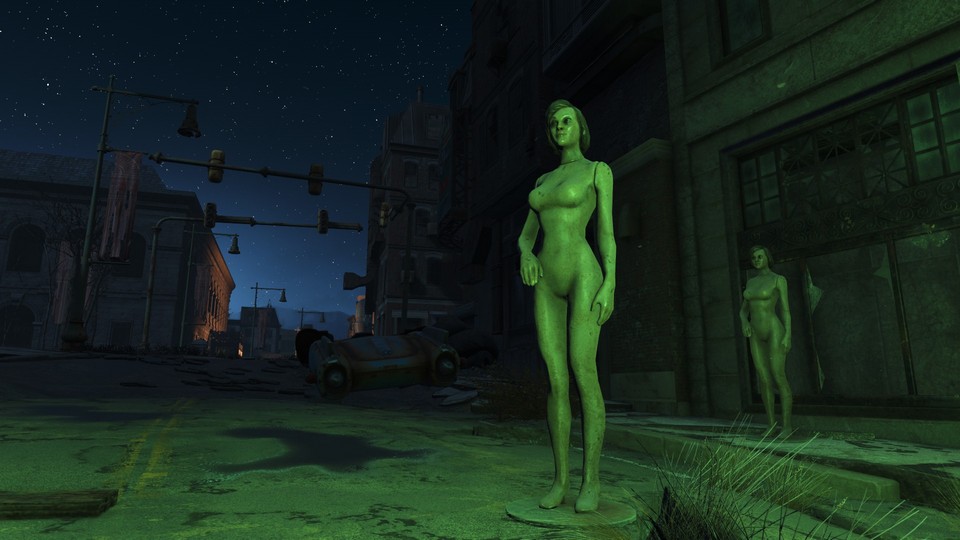
We’ve by now wandered far from the vault, picking through the gutted townships of ideas and influence, eager for bits of scrap meaning. At times we might have forgotten we were in the Wasteland at all. But to forget where we are and what we want is the very condition of the Wasteland, in which frugality means excess, religion means godlessness, reverence means domination.
Whether the writers of Fallout sought these ideas is irrelevant, as is whether the series is in intention a worshipful fantasy of a world where bureaucracies are hauled to the ground and the presiding force is ‘realised will’, or instead a grotesque satire of these things, a reductio ad absurdum of McCarthyism and Reaganomics and the American dream and everything Ayn Rand ever said or wrote. What’s relevant is that we, desirous of some kind of view of ourselves (American or otherwise), find that Fallout is such a reflection. In it is projected our doublethink of both wanting and fearing catastrophe, wanting and fearing loneliness.
‘Man is the cruellest of animals,’ says Nietzsche. ‘At tragedies, bullfights, and crucifixions has he hitherto been happiest on earth. And when he invented his hell, behold, that was his heaven on earth’
Notes

